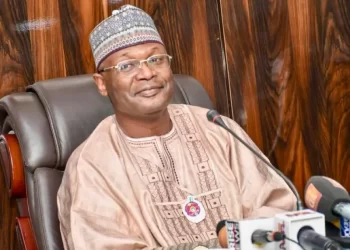
The trial of former Central Bank of Nigeria (CBN) Governor, Godwin Emefiele, took a new turn on Tuesday as the Ikeja Special Offences Court was informed that its order for a forensic examination of a mobile phone central to the case has stalled due to procedural disagreements between the parties.
Presiding over the matter, Justice Rahman Oshodi had earlier ordered that the mobile device, marked “iPhone 2”, along with its WhatsApp messages—tendered as key evidence by the Economic and Financial Crimes Commission (EFCC)—be subjected to an independent forensic examination. The process was to involve experts from both the prosecution and defence teams.
However, during the proceedings on Tuesday, Emefiele’s counsel, Olalekan Ojo, SAN, reported that the forensic analysis failed to proceed as planned on the court-assigned dates, September 24 and 25, 2025. He alleged that the EFCC had twice obstructed the process.
According to Ojo, although both parties and the court’s Registrar were present on the scheduled days, the EFCC declined to allow full access to the device.
“The first obstacle was the EFCC’s refusal to expose the device to the entire team,” Ojo stated.
“On the second day, despite the Registrar’s clarification of the court’s order, EFCC officials refused to produce the phone when the Apple expert requested it. They gave a categorical ‘No’.”
Ojo emphasized that the examination must be conducted without restrictions, insisting that the EFCC’s actions had prevented compliance with the court’s order. He urged the court to issue a fresh directive to ensure the experts receive proper access to the phone and its WhatsApp contents.
In response, Rotimi Oyedepo, SAN, counsel to the EFCC, contested the defence’s position. He argued that the defence’s earlier forensic efforts were flawed and violated standard procedures, noting that the expert in question operated without a verifiable office or physical lab, and allegedly used a live internet connection, risking the integrity of the data.
“Their method could lead to auto-syncing, potentially altering Exhibit E. We must protect the integrity of the device,” Oyedepo said.
He clarified that the iPhone remains on flight mode to prevent tampering and reaffirmed the prosecution’s commitment to transparency. However, he stressed that handling of the exhibit must follow due process.
Despite the disagreement, defence lawyers, Ojo (SAN) and A. Kotoye (SAN), maintained that the forensic report is critical to their case. They requested the court to defer further witness testimony until the analysis is properly conducted.
Justice Oshodi acknowledged their concerns but declined to halt proceedings. He ordered the EFCC to file its forensic report within 24 hours and allowed the prosecution to continue presenting its witness, citing that the witness had travelled from Abuja specifically for the hearing. He also instructed both parties to adopt electronic service of documents to avoid future delays.
Emefiele is facing 19 counts of alleged fraud, including receiving gratification, corrupt practices, and abuse of office. His co-defendant, Henry Omoile, faces three separate counts related to unlawful acceptance of gifts. Both men have pleaded not guilty.
Following the brief ruling, the trial resumed with testimony from Alvan Gurumnaan, an EFCC operative and the prosecution’s witness. Gurumnaan detailed findings from the commission’s investigations, including multiple foreign currency cash deliveries allegedly linked to Emefiele and his associates.
He stated that the EFCC had interviewed several individuals, including staff from the CBN and Zenith Bank, as part of the probe. The witness presented WhatsApp chats (Exhibits P1–P27) that allegedly documented repeated large cash deliveries arranged via intermediaries.
Justice Oshodi adjourned the matter to October 8 and 9, 2025, at 12:00 noon for continuation of trial.
























